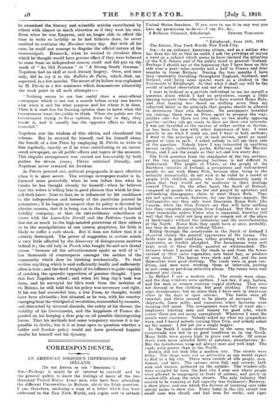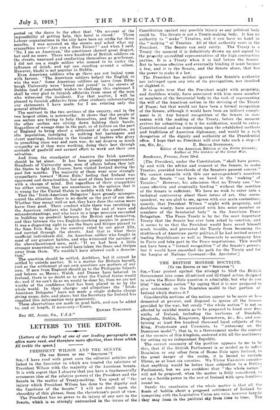CORR.ESTIONT.)ENCE.
AN AMERICAN SOLDIER'S IMPRESSIONS OF IRELAND.
[To THE EDITOR Or TED " SPECTATOR.") SIE,—Perhaps it might be of interest to yourself and to the general public to know the feelings of many of the two thousand United States Army men, who have been attending the different Universities in Britain, about the Irish question. I am, therefore, enclosing a copy of a letter which has been addressed to the New York World, and copies sent to certain
United States Senators. If you care to use it in any way you have my permission, to do so.-1 am, Sir, &c.,
2 Bellevue Crescent, Edinburgh. EDWARD Tomnisoa.
"Edinburgh, June 11th, 1919. The Editor, New York World, New York City.
Si,—As an ordinary American citizen, and as a soldier who has done his bit as best he could, I ask the privilege of saying a word on a subject which seems to have claimed the attention of the U.S. Senate and of the public mind in general—Ireland., Perhaps I should say at the beginning that I have been on this side over a year—nine months and a half in France and four months in Great Britain. During the four months I have been constantly travelling throughout England, Scotland, and Ireland, and doing some special work as a student in the University of Edinburgh. So that what I shall say will be the result of actual observation and not of hearsay.
I went to Ireland as a private individual to see for myself a question about which I had no prejudices, except a little leaning towards those who claimed to have wanted Home Rule, and that leaning was based on nothing more than my inherited belief in the principle that peoples should be allowed to determine their own destinies. No newspapers heralded my coming; there was no Press agent to prepare the way; neither side—for there are two sides, or two madly opposing parties—neither side got ready to show me their own interests. I was not heralded as the saviour of either section or faction, as has been the case with other Americans of late. I went quietly to see what I could see, and I went to both sections; I went to the principal city in each section, spent an equal period of time in each. I asked nobody to tell me their side of the question. Nobody knew I was interested in anything except castles, cathedrals, parks, Killarney and the Blarney Stone, and I saw the people as they act and live every day.
The Irish question from the standpoint of the two sections, or the two principal opposing factions, is not difficult to understand. The people of Ulster, or the people of the Northern counties of Ireland, a prosperous and well-ordered people, do not wish Home Rule, because they, being in the minority numerically, do not wish to be ruled by a crowd of people with childish minds, who have vehemently made it plain that they would not be moderate in their dealings toward Ulster. On. the other hand, the South of Ireland, composed of people who are fed and gorged by agitators and self-seeking demagogues, claim to want-Home Rule. They are not quite certain, however, for one faction—namely, the Nationalists—say they only want Dominion Home Rule, like. Canada, while the Sinn Feiners say they will have nothing less than complete separation from England. But they do not want separation unless Ulster also is separated, knowing full well that they could not long exist or remain out of the abyss of bankruptcy without the industries and the manufacturing of the North. Home Rule they could have at once, probably, but they do not desire it without Ulster.
Riding through the countryside in the North of Ireland I observed closely the general appearance of the farms. The fields were in good condition, either growing with grain and vegetables, or freshly ploughed, The farmhouses were well kept, most of them freshly painted or whitewashed. The farmers whom I passed on the roads to and from the towns carried in their carts vegetables, new baled hay, or produce of some kind. The horses were sleek and fat, and the men themselves wore good clothing. The roads were in good condition, and men were working them at intervals, putting in new stone or patching defective places. The towns were well ordered and clean.
In Belfast I saw a modern city. The streets were clean, and the shop windows were spotless. I saw few, if any, loafers-, and few men or women wearing ragged clothing. They were not dressed in fine clothing, but good clothing. There was some drunkenness, but no more than I have seen in American cities in the days of open saloons. The hotels were all crowded, and there seemed to be plenty of servants. The shipyards, linen mills, and numerous other factories were running full speed. The newspapers were full of want ads.— employers wanting men and women for good jobs, which weans there are not many unemployed. Wherever I went the people were courteous. Nobody asked me what my sympathies were, and I heard nobody cursing Sinn Fein, and nobody asked me for money. I did not see a single beggar.
In the South I made observations in the same way. The countryside was not in as good condition as in the North. Many fields were grown high in grass and weeds. Of course there were some splendid fields of potatoes, strawberries, &e. But the farmhouses we: not always neat and well kept. The roads were poorer than in the North.
Dublin did not look like a modern city. The streets were filthy. The shops were not as attractive as one would expect ta find in a big city. There were crowds of idle people, men, women, and boys. The saloons were full, and crowds, both men and women, gathered on the outside. The window-sills were occupied by men, the first city I ever saw where people were allowed to congregate in front of saloons, and perch on window-sills along the main streets. The only industry that seemed to be running at full capacity was Guinness's Brewery, a show place, and one which the drivers of jaunting cars take special pains to show you. Every hotel in the city except two small ones was closed, and had been for weeks, and signs posted on the doors to the effect that 'On account of the impossibility of getting help, this hotel is closed.' Three Labour organizations in the city have been on strike for three months. I was accosted on the streets and asked what my sympathies were—'Are you a Sinn Feiner?' and when I said, No. I am an American,' the questioner showed great disgust, but said no more. There were hundreds of British soldiers on the streets, unarmed and conducting themselves as gentlemen. I did not see a single soldier who seemed to be under the influence of drink, and not one standing around a saloon. However, khaki is not popular in Dublin.
Even American soldiers who go there are not looked upon with favour. The American soldiers helped the English to win the war.' Some American soldiers on leave from Edin
burgh University were hissed and jeered' in the streets of Dublin (and if somebody wishes to challenge this statement I
shall be very glad to furnish affidavits from some of the men who witnessed the incident). For that matter, I will he pleased to furnish affidavits from other students substantiating any statements I have made, for I am relating only the general situation. The contrast in the two sections of the country, and in the two largest cities, is noteworthy. It shows that the people of one section are trying to help themselves, and that those in the other section are sitting down holding their hands, Regardless of wrongs done in the past, or of failure on the part of England to bring about a settlement of the question, an idle population, indulging in nothing but harangues and street meetings, listening to the tirades of leaders who glory in preaching class war and race war, do not deserve so much sympathy as if they were working. doing their best through methods of goodwill and earnest effort to work out their own salvation.
And from the standpoint of America the Irish question should be let alone. It has been grossly misrepresented.
Hundreds of University men, men of affairs before they left the States to fight in France, have visited Ireland during the past few months. The majority of them went over strongly sympathetic toward 'Home Rule,' feeling that Ireland was oppressed and down-trodden, but most of them have coins away with a change of mind. But regardless of their sympathies for either section, they are unanimous in the opinion that it is wrong for the United States to meddle with the affair.
That the 'Irish-American Delegates' have •grossly misrepresented the situation there is no-doubt on the part of our men.
Whether they meant well or not, they have done the cause more harm than good. Their conduct while there was revolting to the American soldiers who fought for the end of wars and misunderstandings, and who have in a large measure succeeded in building up goodwill between the British and themselves, and thus between the two English-speaking peoples in general.
It was a disgusting sight to see the Stars and Stripes pinned to the Sinn Fein flag, in the country ruled by our great Ally, and carried through the streets. And that is what these unofficial individuals did. An American soldier who fought in most of our greatest battles, and who witnessed the parades of the above:Inentioned men, said : If we had been a little stronger numerically we would have taken the Stars and Stripes away from them. We wouldn't have allowed such a desecration.' The question should be settled, doubtless, but it cannot be settled by outside parties. It is a matter for Britain herself, just as the settlement of our own questions are matters of our own. If men from England should go to the Philippine Islands and behave as Messrs. Walsh and Dunne have behaved in Ireland, there is no doubt as to what the United States would do; and if we can't do as we would be done by, then we are not worthy of the confidence that has been placed in us by the whole world. In their charges and allegations the IrishAmerican Delegates have not made a single definite charge giving name, date, and place; but the Secretary for Ireland has supplied this information very generously. These observations are made in good faith, and can be added to, and at length, if necessary.—Yours, '
EDWARD TOMLINSON
Box 162, Jesup, Ca., U.S.A."















































 Previous page
Previous page